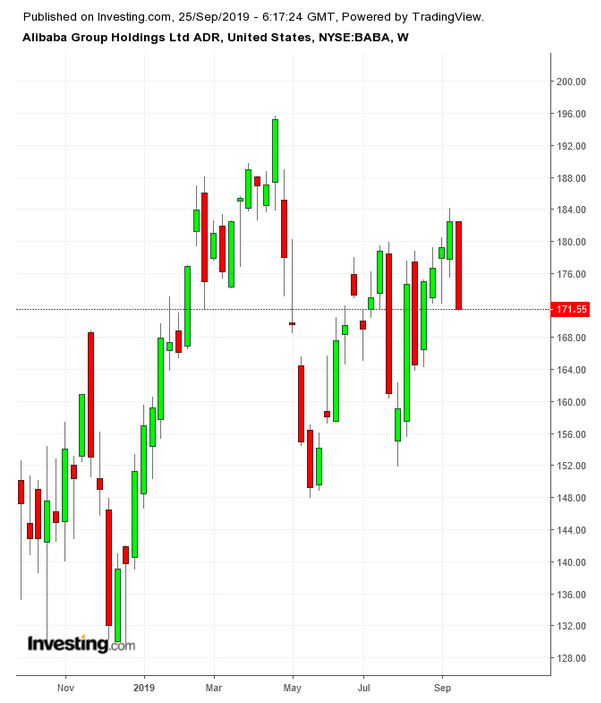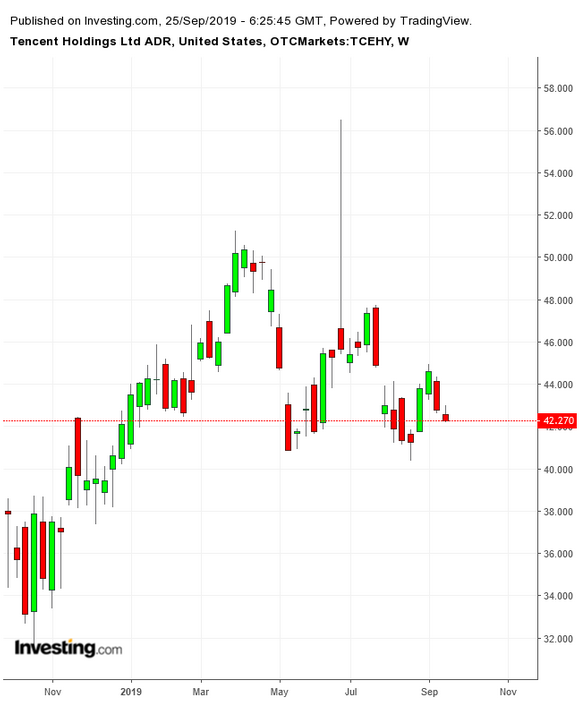There's been quite a visible divergence this year between the shares of Alibaba Group Holdings (NYSE:BABA) and Tencent Holdings (OTC:TCEHY), China’s two leading internet companies. Both have been hit by the Asian nation's economic woes, which have been squeezing consumer spending and advertising.
But Alibaba, China’s largest e-commerce giant, whose stock has surged about 28% this year, is weathering this deep slowdown much better than Tencent, whose shares continue to lag, having gained just 8% so far in 2019.
Alibaba's rebound follows a painful 2018 in which the stock fell 20%. Tencent lost almost a quarter of its value over the same period after China’s economy hit a slow patch and the prospects of a devastating trade war with the U.S. sapped investor confidence.
A deeper dive into each company's recently released earnings reports provides a more nuanced perspective regarding potential problems or bright spots for 2020.
Alibaba: Earnings Momentum Remains Strong
Alibaba, whose Taobao and Tmall marketplaces connect merchants with Chinese consumers, showed in its latest quarterly earnings report that the strength of its platform remains intact despite the slowing Chinese economy and disturbances on the macro front. Last month, it reported revenue and profit numbers that easily beat analyst estimates. Revenue soared 42%, while net income more than doubled.

What insulated China's Amazon (NASDAQ:AMZN) equivalent from the effects of the escalating Sino-U.S. trade war was a massive consumer shift to internet shopping, coupled with sales promotions across the country. Growth in its cloud computing division, which commands half the country’s market share, expanded 66%.
Going forward, Alibaba has a much better chance to grow and diversify. The company has invested heavily to expand in the cloud computing business, by opening new data centers in Europe, the Middle East, South Asia, Southeast Asia and in the domestic Chinese market.
In a recent interview with Business Week, Alibaba’s new chairman Daniel Zhang said Alibaba is uniquely positioned to pull together the online and offline worlds in groceries and beyond. Indeed, dozens of his new initiatives are leading Alibaba deeper into new arenas including finance, health care, movies and music.
Tencent: Gaming Division Facing Regulatory Hurdles
Tencent, sometimes referred to as China's Facebook (NASDAQ:FB), continues struggling to recover from the slowdown it experienced last year. That's because, in 2018, the Shenzhen-based internet services company's lucrative gaming business was hit by Chinese government controls. In addition, the macro environment in which it operates worsened with companies markedly slowing their spending, hurting Tencent's advertising business.

Unfortunately, many macro factors that would support the company's recovery are still absent.
The latest evidence of this lingering weakness came when the company reported its Q2 earnings last month. Online ad revenue grew at a worse-than-expected 16%.
While sales of social media ads and “others” jumped 28%, media ad revenue fell 7% because of unexpected delays in the airing of certain drama series.
And though regulators are again allowing new games to be released after last year’s freeze—including Tencent’s 2019 breakout hit, Peacekeeper Elite—they’re doing so at a slower pace. That hurdle is slowing the revival of the gaming business which brings in more than 40% of Tencent's total revenue.
“Our assumption is that the macro environment will remain difficult for the rest of the year,” Chief Strategy Officer James Mitchell told analysts on a conference call as cited by Bloomberg. “The situation of the heavy supply of advertising inventory will continue for the rest of the year, and potentially into the next year,” he said, adding this could affect revenue from the automobile, real estate and financial services sectors.
Analysts say Tencent can still muster growth in the second half, on the back of its highly popular title, Peacekeeper Elite as well as older, durable titles such as Honour of Kings. It released 10 games in the second quarter.
In addition to its gaming division, analysts will also be zeroing in on Tencent's efforts to diversify its revenue base by bringing in more sales from its WeChat Pay service, cloud computing and wealth management.
The unit that includes these businesses saw 37% growth in the quarter. Its Licaitong wealth management platform, which competes with Alibaba-owned rival Ant Financial, accumulated 800 billion yuan of customer assets by the end of June.
Bottom Line
Without doubt, Alibaba, whose stock closed yesterday at $171.55, has proven to be a better bet in 2019 for any investors who already have shares in their portfolios. The company’s e-commerce strength and local exposure, in our view, will keep it insulated from a variety of macro risks that other players are facing.
Still, we also like Tencent and find its current weakness, the stock closed at $42.270 yesterday, an opportunity to accumulate. The company's gaming pipeline is strong and well on track to broaden its revenue base. As well, Tencent's business model is proving to be much more durable versus many of its western peers.
